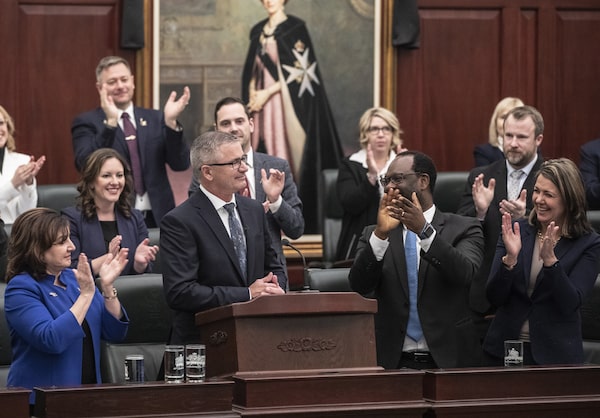
Alberta Finance Minister Travis Toews is applauded as he delivers the 2023 provincial budget in Edmonton on Feb. 28.JASON FRANSON/The Canadian Press
Travis Toews, the only finance minister the United Conservatives have ever had, save for a handful of months when the first-term politician stepped aside to challenge for the leadership of the party, is remaining mum on whether he will run in Alberta’s spring election.
“We will be finalizing a decision and making our announcement public here in the upcoming days,” Mr. Toews told reporters Thursday after delivering a lengthy speech touting Alberta’s budget in Calgary. “There’s many considerations out there – personal, business and family. As well as certainly a deep commitment to this province and to Albertans, so we’re working through that.”
He refused to say whether Premier Danielle Smith, who bested him in the United Conservative Party leadership race last year, offered to keep him on as finance minister if he ran again in Grande Prairie-Wapiti and their party prevailed over the New Democrats in the election. He said he remains committed to the UCP, which polls indicate are in a tight race with the NDP. “It has been a privilege to serve these last four years.”
No matter which way he’s leaning, the minister, however, has an eye on Alberta’s future.
“I have a great aversion to passing on irresponsible fiscal decisions and burdening those decisions on the next generation in the form of debt,” Mr. Toews said when explaining the new fiscal framework proposed in the 2023-24 budget tabled this week. “And so this is a legacy for all Albertans.”
Mr. Toews said he spent the past 18 months thinking about how to build a durable fiscal framework that will provide “guardrails” when the province is flush with royalty revenue and flexibility during financial droughts.
His most recent budget, which forecast revenue to exceed expenses by $2.4-billion in the coming fiscal year, stipulates that Alberta must direct half of any surplus to repay debt maturing that same year. The remaining half will go into the new Alberta Fund, which can be directed toward debt, the Alberta Heritage Savings Trust Fund, or one-time costs such as major infrastructure projects or affordability programs.
“In surplus years, we should not be ratcheting up on the ongoing cost structure of delivering government services,” he told a crowd of 290 people at a Calgary Chamber of Commerce breakfast. “Because that will ultimately haunt us in years where we are challenged.”
The fiscal framework would also limit spending increases to the previous year’s inflation plus population growth. “That will ensure we don’t create conditions for aberrant behaviour, [with] government departments wanting to spend all their money so they get a higher base next year.”
Further, he proposed reinvesting all of the Heritage Fund’s earnings back into the savings account, rather than the current minimum of offsetting inflation with the remainder flowing into general revenue.
Mr. Toews is considered a steady hand with socially and fiscally conservative values. Under his tenure as finance minister, Alberta posted its first surplus since 2015 in fiscal 2021-22, thanks largely to surging energy prices and despite the drag the coronavirus placed on government finances around the globe. He has stayed largely out of the spotlight and free of scandal, save for being among those in former premier Jason Kenney’s inner circle surreptitiously photographed dining on a balcony in violation in COVID-19 restrictions.
Ms. Smith returned Mr. Toews to his position as finance minister, the most powerful position in cabinet, after she beat him in the leadership race last October. Under her leadership, Alberta reversed a number of decisions Mr. Toews instituted under Mr. Kenney, when the government was strained by rock-bottom energy prices as COVID-19 battered the global economy. Alberta, for example, recently reindexed government support programs and capped tuition increases after the province raked in record royalties for the year ending March 31. The next election is tentatively scheduled for the end of May.
The budget contains new money to broaden Alberta’s addiction treatment programs and hire more sheriffs, among other efforts. It is devoid of any financial support for Alberta’s largest city, which hoped to garner a boost for its still-struggling downtown core.
Deborah Yedlin, president of the Calgary Chamber of Commerce, said the lack of support sends a bad message.
“Zero is an insult,” she told reporters. “There is a gap in terms of the understanding about how you actually have to present yourself as a jurisdiction that is investing in its own future.”
She added: “If you believe in your business, you invest in your business. We are part of that business. Let’s see some investment.”